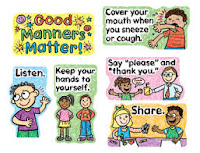A month back, I was inquiring about summer camp for my
toddler and asked the representative of one of the camps, that do they teach
anything related to manners/etiquette's. She said, ‘’not for this age group”. Well, my
daughter is 2.6 and I was totally surprised as to what a foolish question I
asked. She is too small for even to know what is mannerism all about. Though I
try to guide her with little basic etiquette but sometimes I feel all this is
taking her childhood away.
If children don’t mess up their food, scatter things, spill
water, jump around, shout or talk loudly, who will do, we? Infact, I have seen
many adults behaving like kids. Then why groom them from a toddler age. But it
is well said, all that starts well ends well.
What if we were not controlled & disciplined by our
parents? What if we were not thought to eat, sit, walk & talk with
etiquette? We would have never known how to respect ourselves & others.
Mannerism is defined, ‘as
a habitual gesture or way of speaking or behaving’. It is considered one of the
most important qualities in human.
Good manners makes a person
sophisticated & is also popular among his counterparts. I have heard people
praise not only their children but also their parents who show signs of good
behavior.
So how do we inculcate good manners in children? There is no
hand & stick rule here. One has to be sharp, observant & patient as a
parent.
-Firstly, analyze why your child is behaving in a particular
way. Is he/she showing any readiness to learn new things?
-Do not nag or push them, in just learning things. Rather
than make it a learning experience.
-Children learn from home. Mannerisms seed starts sowing
from home. We can be their mirror. Social etiquette's are learnt from family
members and carried throughout life.
-Some basic steps like knocking door before entering, asking
before borrowing, sharing, respecting elders, not invading in private matters,
eating correctly, cleaning their own rooms or putting back toys & other
stuff, greeting - hello, goodbye, sorry, thank you, showing appreciation, talking
softly, not bullying anyone, etc., would just be a stepping stone to a well groomed
conduct.
-Do not compare with other children. Every child is
different. Some understand easily, some take a little more time.
-Do not be very strict and set many rules. Children don’t like
too many boundaries. Once they turn 3, they become more independent and audacious.
-Sometimes children tend to do certain things, just to grab
attention. Give them as much as devotion you can.
-If they are having frequent mood swings, try distracting
them. Rather than giving heat to their behavior, try to ignore and ask for a time-out.
-Respect their individuality, likes & choices.
-Train them regularly. Children have a high grasping power.
-Nurture their strength rather than just highlighting their weakness.
Most important,
shower them with lots of love & support.

Good one
ReplyDeleteGood one
ReplyDeleteNice must follow
ReplyDeleteThank u
ReplyDelete